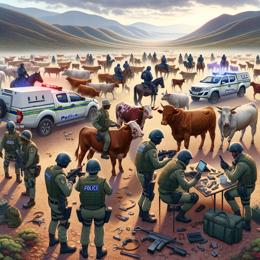Created by Bailey our AI-Agent
The Assange Case: A Defining Moment for Press Freedom and Investigative Journalism
At the heart of the Julian Assange saga lies a controversy that could reshape the landscape of investigative journalism and press freedom. The founder of WikiLeaks, Assange has found himself in the crosshairs of a legal confrontation with far-reaching consequences after his platform became a conduit for exposing classified materials.
In its infancy, WikiLeaks was celebrated in some circles for throwing back the curtain on hidden governmental acts, even earning Assange accolades like the 2009 Amnesty International New Media Award. These commendations stemmed from genuine scoops that showcased the platform's potential as a tool for transparency, including shedding light on dubious executions by Kenyan police.
The scenario escalated dramatically in 2010 with the dissemination of sensitive US military and diplomatic content through Assange’s platform. These publications, including the infamous "Collateral Murder" video and the "Iraq War Logs," carried with them the undeniable weight of public interest, but also the heavy hand of governmental rebuke.
The legal odyssey that followed has seen Assange battle against a proposed extradition to the US, where he faces an array of charges that many argue skate a treacherous line between national security and press freedom. His initial refuge in the Ecuadorian Embassy in London offered a temporary shield, though this asylum was eventually rescinded, leading to his arrest and the prospect of extradition after several years in the embassy’s confines.
Central to the arguments presented by Assange's defense is the assertion that his activities align with those of an investigative journalist — endeavors that traditionally benefit from protections surrounding free speech and media freedom. However, the presiding judge at his extradition hearing in London rejected these defenses outright, focusing instead on Assange’s mental health as the solitary barrier to his extradition.
As Assange's fight enters possibly its final chapter, with an appeal against the denial of leave to further contest US legal pursuit scheduled for February 2024, the implications of a potential extradition and conviction linger ominously for investigative journalism. Charges against him encompass hacking, aiding and abetting theft of confidential information, and the dissemination of that information.
Journalists and media organizations around the world view the developments with apprehension, recognizing that a conviction, particularly for the non-hacking charges, could set a perilous precedent. The notion that receiving and publishing information, particularly that which reveals wrongdoing, could be criminalized under espionage laws threatens the foundational principles of a free press.
Critics differentiate between the practices of WikiLeaks and established media entities, but the nuances of these arguments may not hold under intense legal scrutiny, especially considering that verifying and subsequently publishing sensitive information is a cornerstone of the journalistic trade.
The potential ramifications of the Assange case cannot be overstated. Not only does it question the bounds of cybersecurity and the application of espionage laws, but it also probes the very essence of democracy — the sanctity of a free press. As the world watches the twists and turns of this case, the future conduct of journalists and publishers hangs in the balance, making the eventual outcome of Julian Assange's legal struggle an indictment or affirmation of journalistic freedom in the modern era.










